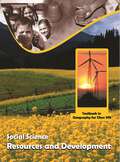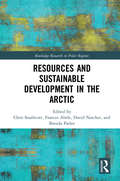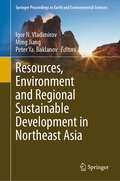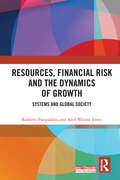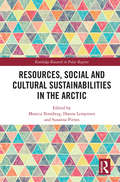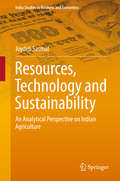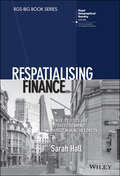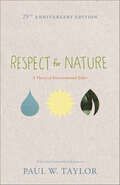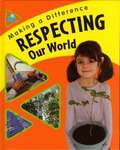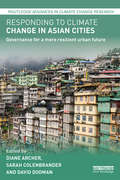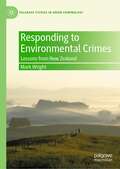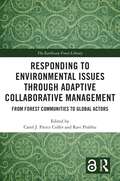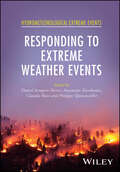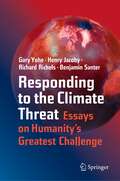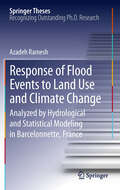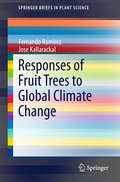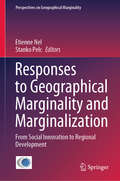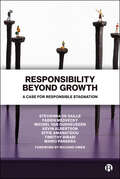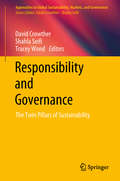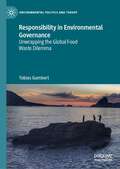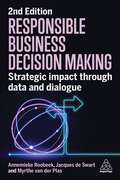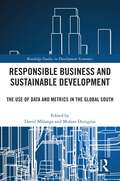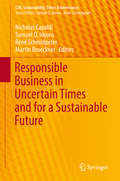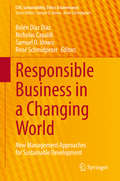- Table View
- List View
Resources And Development class 8 - NCERT - 23 (Geography)
by National Council of Educational Research and Training"RESOURCES AND DEVELOPMENT" is a Geography textbook designed for Class VIII, focusing on the fundamental concepts of resources and their sustainable development. The textbook explores the diverse range of resources available on Earth, including natural resources like land, water, minerals, and forests. It delves into the geographical distribution of these resources, emphasizing the significance of their judicious utilization. The text introduces students to the concept of resource planning and management, encouraging an understanding of the delicate balance between resource exploitation and conservation. Through case studies and practical examples, the textbook aims to cultivate an awareness of environmental issues and the need for responsible resource use among the students, laying the foundation for a holistic understanding of geography and sustainable development.
Resources and Sustainable Development in the Arctic (Routledge Research in Polar Regions)
by David Natcher Chris Southcott Frances Abele Brenda ParleeOver the past thirty years we have witnessed a demand for resources such as minerals, oil, and gas, which is only set to increase. This book examines the relationship between Arctic communities and extractive resource development. With insights from leading thinkers in the field, the book examines this relationship to better understand what, if anything, can be done in order for the development of non-renewable resources to be of benefit to the long-term sustainability of these communities. The contributions synthesize circumpolar research on the topic of resource extraction in the Arctic, and highlight areas that need further investigation, such as the ability of northern communities to properly use current regulatory processes, fiscal arrangements, and benefit agreements to ensure the long-term sustainability of their culture communities and to avoid a new path dependency This book provides an insightful summary of issues surrounding resource extraction in the Arctic, and will be essential reading for anyone interested in environmental impact assessments, globalization and Indigenous communities, and the future of the Arctic region.
Resources, Environment and Regional Sustainable Development in Northeast Asia (Springer Proceedings in Earth and Environmental Sciences)
by Ming Jiang Igor N. Vladimirov Peter Ya. BaklanovThis book highlights the environmental issues, an assessment of environmental risks within the borders of Northeast Asia and neighboring territories. This book pays special attention to the transboundary factor as the main factor in international and interregional cooperation. This book develops methods of complex, thematic, interpretative mapping, geoinformation modeling, processing of remote sensing data for geographical and environmental studies, models for the analysis of spatial and temporal geographic data, and their long series. The book is planned to widely cover economic, physical–geographical and environmental studies, including the analysis of natural resources from the state of the natural environment and resource potential to its change under the influence of various factors.
Resources, Financial Risk and the Dynamics of Growth: Systems and Global Society
by Roberto Pasqualino Aled Wynne JonesThis book presents a new System Dynamics model (the ERRE model), a novel stock and flow consistent global impact assessment model designed by the authors to address the financial risks emerging from the interaction between economic growth and environmental limits under the presence of shocks. Building on the World3-03 Limits to Growth model, the ERRE links the financial system with the energy, agriculture and climate systems through the real economy, by means of feedback loops, time lags and non-linear rationally bounded decision making. Prices and their interaction with growth, inflation and interest rates are assumed to be the main driver of economic failure while reaching planetary limits. The model allows for the stress-testing of fat tail extreme risk scenarios, such as climate shocks, energy transition, monetary policies and carbon taxes. Risks are addressed via scenario analyses, compared to real available data, and assessed in terms of the economic theory that lies behind. The book outlines the case for a government led system change within this decade, where the market alone cannot lead to sustainable prosperity. This book will be of great interest to scholars of climate change, behavioural, ecological and evolutionary economics, green finance, and sustainable development.
Resources, Social and Cultural Sustainabilities in the Arctic (Routledge Research in Polar Regions)
by Monica Tennberg Hanna Lempinen Susanna PirnesThis book focuses on the understudied social and cultural dimensions of sustainability in the Arctic. More specifically, it explores these thematics through paying attention to resources in different definitions and forms and the ways in which they entangle in the realities and expectations of social and cultural sustainability in the region. The book approaches resources as socially and culturally constructed and also draws attention to social, human and cultural capabilities and the roles they have in making and shaping the imaginaries of sustainability. Together, this volume and its case studies contribute to a broadened understanding of the interplay of natural and material resources and social and cultural capabilities as well as their discursive framings. This multidisciplinary text includes contributions from political sciences, sociology, gender studies, regional studies, economics and art research. With its wide range of conceptually informed case studies, the book is relevant for researchers and professionals as well as advanced students and for institutions and organizations offering education in Arctic affairs.
Resources, Technology and Sustainability
by Joydeb SasmalThis book uses sound theoretical frameworks and econometric techniques to rigorously analyze and explain the conditions of sustainable growth in agriculture. It further investigates how management of natural resources and technological advances can enhance productivity and ensure sustainable growth in agriculture. Optimal control theory, dynamic optimization problems and theory of risk and uncertainty are extensively used to create theoretical models for analyzing agricultural growth. The results demonstrate that crop diversification, rainwater harvesting and the use of organic fertilizers can ensure growth in agriculture from a dynamic perspective. Further, they show how excessive depletion of ground water, intensive farming and overuse of chemicals in connection with the adoption of modern technology in agriculture have placed tremendous strains on natural resources like land and water, and have called into question the sustainability of growth in the farming sector.
Respatialising Finance: Power, Politics and Offshore Renminbi Market Making in London (RGS-IBG Book Series)
by Sarah HallRESPATIALISING FINANCE ‘In Respatialising Finance Sarah Hall uses the internationalisation of the Chinese Renminbi (RMB) to work through a sympathetic conceptual and empirical critique of prevailing analyses of International Financial Centres (IFCs). Her conceptual (re)framing stresses the politics, institutions and economics of IFCs and will be essential reading for all social scientists interested in the dynamism of contemporary finance and financial centres.’Professor Jane Pollard, Centre for Urban and Regional Development Studies (CURDS), Newcastle University, UK‘Through detailed study of Chinese RMB internationalisation and combining analytical insights from economic geography, sociology, and international political economy, Sarah Hall shows why offshore networks anchored in territories such as the City of London are both core to global monetary and financial landscapes, and provide a key terrain for state power and politics.’Professor Paul Langley, Department of Geography, Durham University, UKRespatialising Finance is one of the first detailed empirical studies of how and why London became the leading western financial centre within the wider Chinese economic and political project of internationalising its currency, the renminbi (RMB). This in-depth volume examines how political authorities in both London and Beijing identified the potential value of London’s international financial centre in facilitating and legitimising RMB internationalisation, and how they sought to operationalise this potential through a range of market-making activities.The text features original data from on-the-ground research in London and Beijing conducted with financial and legal professionals working in RMB markets and offers an original theoretical approach that brings economic geography into closer dialogue with international political economy. Recent work on territory illustrates how financial centres are not simply containers and facilitators of global financial flows – rather they serve as territorial fixes within the dynamic and crisis-prone nature of global finance.
Respect for Nature: A Theory of Environmental Ethics (Studies in Moral, Political, and Legal Philosophy #51)
by Paul W. TaylorWhat rational justification is there for conceiving of all living things as possessing inherent worth? In Respect for Nature, Paul Taylor draws on biology, moral philosophy, and environmental science to defend a biocentric environmental ethic in which all life has value. Without making claims for the moral rights of plants and animals, he offers a reasoned alternative to the prevailing anthropocentric view--that the natural environment and its wildlife are valued only as objects for human use or enjoyment. Respect for Nature provides both a full account of the biological conditions for life--human or otherwise--and a comprehensive view of the complex relationship between human beings and the whole of nature. This classic book remains a valuable resource for philosophers, biologists, and environmentalists alike--along with all those who care about the future of life on Earth. A new foreword by Dale Jamieson looks at how the original 1986 edition of Respect for Nature has shaped the study of environmental ethics, and shows why the work remains relevant to debates today.
Respecting Our World (Making a Difference)
by Sue BarracloughDiscover how to make a difference to the planet by reusing things, reducing garbage, recycling materials, and respecting our world. Find out how you can play an active part, from taking your garbage home, to saving water and energy.
Responding to Climate Change in Asian Cities: Governance for a more resilient urban future (Routledge Advances in Climate Change Research)
by David Dodman Diane Archer Sarah ColenbranderThe role of cities in addressing climate change is increasingly recognised in international arenas, including the Sustainable Development Goals, the UN Framework Convention on Climate Change, and the New Urban Agenda. Asia is home to many of the countries that are most vulnerable to climate change impacts and, along with Africa, will be the site of most urban population growth over the coming decades. <P><P>Bringing together a range of city experiences, Responding to Climate Change in Asian Cities provides valuable insights into how cities can overcome some of the barriers to building climate resilience, including addressing the needs of vulnerable populations. The chapters are centred on an overarching understanding that adaptive urban governance is necessary for climate resilience. This requires engaging with different actors to take into account their experiences, vulnerabilities and priorities; building knowledge, including collecting and using appropriate evidence; and understanding the institutions shaping interactions between actors, from the national to the local level. <P><P>The chapters draw on a mix of research methodologies, demonstrating the variety of approaches to understanding and building urban resilience that can be applied in urban settings. Bringing together a range of expert contributors, this book will be of great interest to scholars of urban studies, sustainability and environmental studies, development studies and Asian studies.
Responding to Environmental Crimes: Lessons from New Zealand (Palgrave Studies in Green Criminology)
by Mark WrightThis book provides a critical study of environmental regulation and its enforcement in New Zealand, situated within green criminology. It seeks to address the question of whether the offences in the Resource Management Act 1991 are 'working', by drawing on a range of sources including: central government data, local government policies and reports on enforcement, information requests of councils, studies of local authority enforcement behaviour and case law to. Through highly layered and richly textured analysis, the project exposes the problems that can arise when an expansive approach is taken to offences, penalties and institutional arrangements in an environmental regulatory statute. It emphasizes how discussions of harm and what should be unlawful will ensure that law-makers' enforcement tools will align with their goals for punishment. It examines higher-level issues such as ‘wrongfulness’ and ‘criminality’ in the environmental regulatory context and explores the relevance of its findings to jurisdictions outside of New Zealand. It also discusses the pros and cons of criminalisation and punishment versus restoration. It speaks to those interested in green criminology, regulatory compliance and enforcement, and applications of criminal law.
Responding to Environmental Issues through Adaptive Collaborative Management: From Forest Communities to Global Actors (The Earthscan Forest Library)
by Carol J. Pierce Colfer Ravi PrabhuFocused on forest management and governance, this book examines two decades of experience with Adaptive Collaborative Management (ACM), assessing both its uses and improvements needed to address global environmental issues. The volume argues that the activation and the empowerment of local peoples are critical to addressing current environmental challenges and that this must be enhanced by linking and extending such stewardship to global and national policymakers and actors on a broader scale. This can be achieved by employing ACM’s participatory approach, characterized by conscious efforts among stakeholders to communicate, collaborate, negotiate and seek out opportunities to learn collectively about the impacts of their action. The case studies presented here reflect decades of experience working with forest communities in three Indonesian Islands and four African countries. Researchers and practitioners who participated in CIFOR’s early ACM work had the rare opportunity to return to their research sites decades later to see what has happened. These authors reflect critically on their own experience and local site conditions to glean insights that guide us in more effectively addressing climate change and other forest-related challenges. They showcase how global and regional actors will have to work more closely with smallholders, Indigenous Peoples and local communities, recognizing the key local roles in forest stewardship. This book will be of great interest to students, scholars and practitioners working in the fields of conservation, forest management, community development, natural resource management and development studies more broadly.
Responding to Extreme Weather Events (Hydrometeorological Extreme Events)
by Philippe Quevauviller Anastasios Karakostas Daniel Sempere-Torres Claudio RossiRESPONDING TO EXTREME WEATHER EVENTS An up-to-date discussion of the latest in weather-related event forecasting and management In Responding to Extreme Weather Events, a team of distinguished researchers delivers a timely and authoritative exploration of three international extreme weather projects: ANYWHERE, I-REACT, and BeAWARE. The key contributions from policymaking, science, and industry in each project are discussed, as are the resulting improved measures and technologies for forecasting and managing weather-related extreme events. The authors cover the entire crisis management cycle, from awareness and early warning to effective responses to extreme weather events. Readers will also find: A thorough introduction to the science and policy background of managing extreme weather events Comprehensive explorations of impact forecasting for extreme weather events, including discussion of the ANYWHERE project Practical discussions of how to improve resilience to weather-related emergencies with advanced cyber technologies, including discussion of the I-REACT project A novel framework for crisis management during extreme weather events, including discussion of the BeAWARE project Essential for disaster management professionals, Responding to Extreme Weather Events will also benefit academic staff and researchers with an interest in extreme weather events and their consequences.
Responding to Oil Spills in the U.S. Arctic Marine Environment
by Committee on Responding to Oil Spills in the U.S. Arctic Marine EnvironmentU.S. Arctic waters north of the Bering Strait and west of the Canadian border encompass a vast area that is usually ice covered for much of the year, but is increasingly experiencing longer periods and larger areas of open water due to climate change. Sparsely inhabited with a wide variety of ecosystems found nowhere else, this region is vulnerable to damage from human activities. As oil and gas, shipping, and tourism activities increase, the possibilities of an oil spill also increase.
Responding to the Climate Threat: Essays on Humanity’s Greatest Challenge
by Henry Jacoby Gary Yohe Richard Richels Benjamin SanterThis book demonstrates how robust and evolving science can be relevant to public discourse about climate policy. Fighting climate change is the ultimate societal challenge, and the difficulty is not just in the wrenching adjustments required to cut greenhouse emissions and to respond to change already under way. A second and equally important difficulty is ensuring widespread public understanding of the natural and social science. This understanding is essential for an effective risk management strategy at a planetary scale. The scientific, economic, and policy aspects of climate change are already a challenge to communicate, without factoring in the distractions and deflections from organized programs of misinformation and denial. Here, four scholars, each with decades of research on the climate threat, take on the task of explaining our current understanding of the climate threat and what can be done about it, in lay language—importantly, without losing critical aspects of the natural and social science. In a series of essays, published during the 2020 presidential election, the COVID pandemic, and through the fall of 2021, they explain the essential components of the challenge, countering the forces of distrust of the science and opposition to a vigorous national response. Each of the essays provides an opportunity to learn about a particular aspect of climate science and policy within the complex context of current events. The overall volume is more than the sum of its individual articles. Proceeding each essay is an explanation of the context in which it was written, followed by observation of what has happened since its first publication. In addition to its discussion of topical issues in modern climate science, the book also explores science communication to a broad audience. Its authors are not only scientists – they are also teachers, using current events to teach when people are listening. For preserving Earth’s planetary life support system, science and teaching are essential. Advancing both is an unending task.
Response of Flood Events to Land Use and Climate Change
by Azadeh RameshThis book is an original and novel contribution to flood hazard assessment, climate change and land use change and is intended to serve both as an effective source of information and a valuable basis for priority setting and further technical, financial and political decisions regarding flood hazard assessment. The study area is located on the floodplain of the Ubaye River in the Barcelonnette area, part of the Alpes de Haute Provence in southeast France. The book offers a comparative overview of the major challenges faced when dealing with flood hazards. The research presented is intended to promote a deeper understanding of how climate change and land use change processes have evolved from past to present, and how they affect the flow regime of the Ubaye River based on sound and reproducible scientific arguments. The methodology implemented ranges from remote sensing interpretation to hydrodynamic modeling and includes the application of spatial and statistical modeling. The results of this research provide essential information for policymaking, decision-making support and flood hazard planning in the Barcelonnette area.
Responses of Fruit Trees to Global Climate Change
by Fernando Ramírez Jose KallarackalGlobal climate change is expected to produce increased carbon dioxide levels in the atmosphere, higher temperatures, aberrant precipitation patterns and a host of other climatic changes that would affect all life on this planet. This review article addresses the impact of climate change on fruit trees and the response of the trees to a changing environment. The response of fruit trees to increasing carbon dioxide levels, phenological changes occurring in the trees themselves due to increased temperature and the lower chilling hours especially in the temperate regions, ecophysiological adaptations of the trees to the changing climate, impact of aberrant precipitation, etc. are reviewed. There is very little data on the impact of rising CO2 levels on fruit tree performance or productivity including the temperate region. Based on a large number of observations on the phenology, there is reason to believe that the flowering and fruiting of most species have advanced by quite a few days, but with variations in different crops and on different continents. The chilling hours have also grown shorter in many regions, causing considerable reductions in yield for several species. In the tropics, there is very little work on fruit trees; however, the available data show that precipitation is a major factor regulating their phenology and yield. The ecophysiological adaptations vary from species to species, and there is a need to develop phenological models in order to estimate the impact of climate change on plant development in different regions of the world. More research is also called for to develop adaptation strategies to circumvent the negative impacts of climate change.
Responses to Geographical Marginality and Marginalization: From Social Innovation to Regional Development (Perspectives on Geographical Marginality #5)
by Etienne Nel Stanko PelcThis book examines regional responses to marginality by highlighting social innovation, local capacity and new path formations in what are often seen as economically weak regions where policy and institutional considerations play a key role. Divided into three parts, it covers a wide range of topics related to geographical marginality from various angles, on both regional and local scales. The first part focuses on the role of social innovation and illustrates the themes of social innovation and new localism, local revitalization and social entrepreneurship. The second part then addresses the issues of economic responses, valorization, resource use and local action in response to marginalization. Lastly, the third part explores various policies and measures taken to respond to marginality and intensify regional development in marginal areas.
Responsibility Beyond Growth: A Case for Responsible Stagnation
by Stevienna De Saille Fabien MedveckyCritically assessing growth-based models of innovation policy, this enlightening study sparks new debate on the role and nature of responsible innovation. Drawing on insights from economics, politics, and science and technology studies, it proposes the concept of 'responsible stagnation' as an expansion of present discussions about growth, degrowth, responsibility and innovation within planetary limitations. This important intervention explores real-world relationships between the political economy, innovation policy and concepts of responsibility, and will be an invaluable resource for individuals and civil society organizations who seek to promote responsible innovation.
Responsibility and Governance: The Twin Pillars of Sustainability (Approaches to Global Sustainability, Markets, and Governance #8)
by David Crowther Shahla Seifi Tracey WondThis book examines various aspects of changes to business behavior through the lenses of the “twin pillars” of sustainability – responsibility and governance. It discusses whether the focus of corporate social responsibility has changed so much that we need to think about redefinitions of key concepts in the field, and analyses both the theory and practice in a variety of ways to enable conclusions to be drawn about the changes needed to any definitions.This approach is based on the tradition of the Social Responsibility Research Network, which in its 15-year history has sought to broaden the discourse and to treat all research as inter-related and relevant to business. This book consists of the best contributions from the 16th International Conference on Corporate Social Responsibility and 7th Organisational Governance Conference held in Derby, United Kingdom in August/September 2017.
Responsibility in Environmental Governance: Unwrapping the Global Food Waste Dilemma (Environmental Politics and Theory)
by Tobias GumbertThis book provides a comprehensive study of the notion of responsibility in environmental governance. It starts with the observation that, although the rhetoric of responsibility is indeed all-pervasive in environmental and sustainability-related fields, decisive political action is still lacking. Governance architectures increasingly strive to hold different stakeholders responsible by installing accountability and transparency mechanisms to manage environmental problems, yet the structural background conditions affecting these issues continue to generate unevenly distributed, socially unjust, and ecologically devastating consequences. Responsibility in Environmental Governance develops the concept of responsibility as an analytical approach to map and understand these dynamics and to situate diverse meanings of responsibility within larger socio-political contexts. It applies this approach to the study of food waste governance, uncovering a narrow governance focus on accountability, optimization, and consumer behavior change strategies, opening up spaces for organizing more democratic solutions to a truly global problem.
Responsible Business Decision Making: Strategic Impact Through Data and Dialogue
by Prof. Dr. Annemieke Roobeek Jacques de Swart Myrthe van PlasIn the past, profit was the driving force for most business investment decisions. However, now organizations need to additionally deliver on impact goals. Responsible Business Decision Making provides a practical guide for how organizational leaders can make smart responsible business decisions. It offers a framework that eliminates internal bias, aligns ethical values with business goals and draws on diverse case studies. The book will answer questions such as: how can dialogue and data optimize decision-making? How can ESG goals be translated into concrete manageable actions? Which decisions best suit the strategic objectives of the organization? This new edition has been updated to offer an increased focus on dialogue and data-driven decision making and new coverage on ESG, Sustainable Development Goals (SDGs), digital transformation and the Raworth's Doughnut Economy framework. Readers will benefit from many new international cases covering topics such as ESG investment, SDG impact measurement and sustainability transformation.
Responsible Business and Sustainable Development: The Use of Data and Metrics in the Global South (Routledge Studies in Development Economics)
by David Mhlanga Mufaro DzingiraiResponsible and sustainable business practices are becoming increasingly important in the information age, as companies are realizing the need to address ethical and social issues associated with their operations. In today’s interconnected world, businesses have access to vast amounts of data that can be used to improve their bottom line but can also pose significant risks to individuals and society. At the same time, responsible business practices have the capacity to positively impact international development goals such as poverty alleviation, economic growth, responsible consumption, and health and social welfare.This book presents a transdisciplinary framework for addressing the 2030 Sustainable Development Agenda, offering fresh perspectives from the Global South. It provides an overview of the key challenges and opportunities associated with responsible business practices in the information age, including the need to balance privacy and security concerns with data analytics and innovation. It also highlights some of the best practices and initiatives, such as stakeholder engagement, transparency, and accountability. The book establishes the role of green leadership in promoting responsible production, discusses the importance of measuring and reporting on sustainable innovation, including the use of sustainability metrics and reporting frameworks. Further, it debates the importance of incorporating ethics and sustainability in strategic management practices. It provides a comprehensive understanding of the integration of these values in organizational decision‑making. By delving into the pressing matters that impact our world today, the book generates a sense of urgency and awareness among its audience.Its inclusive approach to exploring various perspectives and opinions invites readers to participate in a constructive dialogue, broadening their understanding and deepening their empathy for different viewpoints.
Responsible Business in Uncertain Times and for a Sustainable Future (CSR, Sustainability, Ethics & Governance)
by Nicholas Capaldi Samuel O. Idowu René Schmidpeter Martin BruecknerThis book offers up-to-date insights into the theory and practice of Corporate Social Responsibility (CSR) and sustainability management. Gathering contributions by a team of international scholars, it shares perspectives from a variety of academic disciplines, including management and tourism as well as accounting, higher education research and supply chain management. Guided by the credo of achieving 'Responsible Business for Uncertain Times and a Sustainable Future,' the authors present their latest reflections on, and possible solutions for, sustainable and responsible business practices. All of the contributions presented here are critical, evidence-based and solution-oriented, making the book both practical and insightful reading for academics and practitioners alike.
Responsible Business in a Changing World: New Management Approaches for Sustainable Development (CSR, Sustainability, Ethics & Governance)
by Nicholas Capaldi Samuel O. Idowu René Schmidpeter Belén Díaz DíazThis book explores the current state of Corporate Social Responsibility (CSR) from an international perspective, the goal being to share ideas and visions for a sustainable future and to provide useful guidelines for academics, practitioners and policymakers in the context of the 2030 “Agenda for Sustainable Development” released by the United Nations. Research on CSR has evolved considerably over the last three decades. However, there are still many unanswered questions concerning the sustainability of business in an increasingly changing world, for example: If most companies consider CSR to be valuable to their organizations, why do only 15% of them systematically implement Social Responsibility initiatives? If CSR has been found to be profitable for companies, why are they so reluctant to develop an active, internal CSR policy? Why are there such significant differences in CSR adoption from country to country? Why does it take a huge crisis to make politicians react and regulate certain core CSR issues? This contributed volume answers these questions, presenting a wealth of case studies and new approaches in the process.
